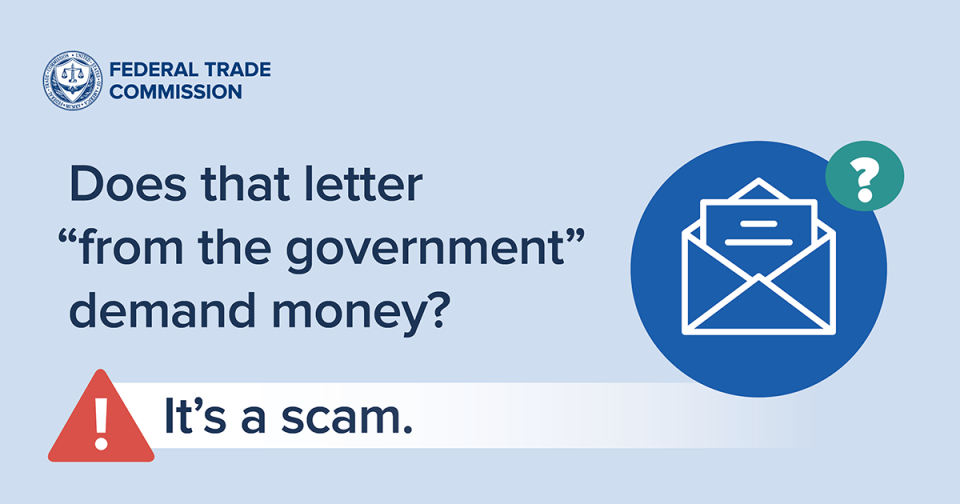You’ve heard about scammers who pose as government workers, calling to demand your money or information. But imposters are running scams by mail too. They’re sending fake forms and letters from made-up agencies to small business owners and demanding payment ASAP. Here’s what to know and do if you get a letter like this.
The fake government letters have agency names that include words like United States, business regulation, and trademark to make them seem legitimate. The letters lie to you, saying it’s time to register or renew a business license or trademark, sending you to a website that asks for your license, Social Security, EIN, and credit card numbers. Usually, the letters warn about fines if you don’t respond fast.
If you get a letter that looks like it’s from the government and demands money or information, stop. It could be a scam. Before you do anything:
- Find out if the agency is real before you respond. Go to USA.gov to verify the names and contact information of federal, state, and local, government agencies. Don’t use any websites or phone numbers listed in the letter.
- Know that the government will never ask you to wire money with services like Western Union or MoneyGram, or pay with gift cards, cryptocurrency, or a payment app. Only scammers will, because it’s hard to track that money, and hard to get it back.
- Check out the advice at Scams and Your Small Business in English, Spanish, and other languages.
If you spot a scam like this, tell the FTC at ReportFraud.ftc.gov. Find out what to do if you paid someone you think is a scammer, or if you gave a scammer your personal information.


what about if they come to your door saying they are from the government what do we supposed to do, let me know please
In reply to what about if they come to… by Arturo Bauer
If anyone comes to your door saying they are from the government, ask to see their badge and tell them you are going to contact the government agency for verification.
I received a call from a gentleman saying he was from social security office which I knew it was scam so I hung up this happened last month in January 2024.
Is there an email we can use to forward scam emails for your investigations?..
In reply to Is there an email we can use… by John Cappelletti
You can help the investigation by reporting to the www.ReportFraud.ftc.gov website. You can give details about the messages you got, and about yourself if you choose. You can also copy the message you got and paste it into your report. The information you give goes into a secure database that the FTC and other law enforcement agencies nationwide use for investigations.
Once again, a nice piece of information, Thank you very much!
Please enlarge words; very difficult to see.
Thank you very much for the extremely important information!
Thank you.
Received letter from IRS letter contained pin number for me to sign on online at
Irs.gov/stafistics /itb2022survey
Also reminding me this is an important survey and voluntary.
I did not attempt signed on due to my online profile has theft for years that includes perviously owned business profile.
Also letter looked suspicious,
If this is an voluntary why IRS did sent second letter stating i haven't don it yet and reminding me to do the survey asap.
Person sent letter from irs
melanie R. krause ,ph.rn
chief Data & Analytics, Officer
research, applied analytics & Statistics(raas)
Received a letter from Entity Solutions. They claimed a fine (excess of $7,000) would be penalized for not having a compliant labor law poster at the business. Cost of $108.
In reply to Received a letter from… by Christian L.
Same here, letter was addressed to Millennium H&H at our address. Looks bogus to me, no such business here plus the posters they promise are all free from the responsible government agencies. This is a second letter for us and I am filing it in the same place I put the first one!
In reply to Received a letter from… by Christian L.
Same Company! Entity Solutions demanding money for my documents that I already paid for through my state website. Scum of the Earth.